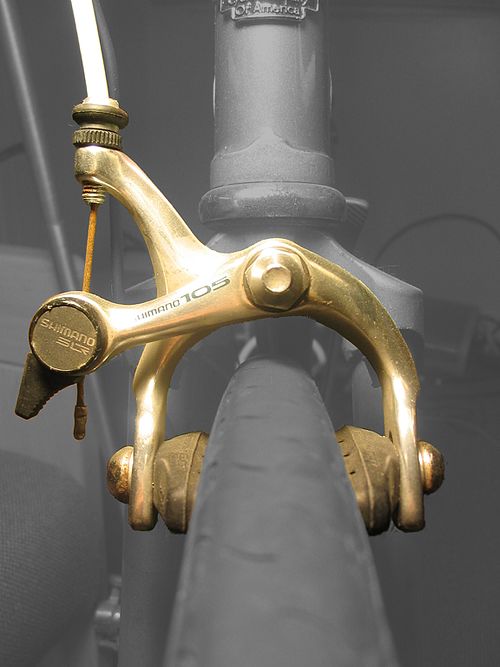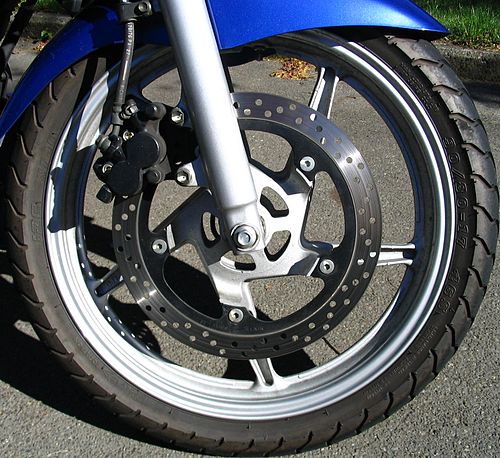Brakenoun
A fern; bracken.
Brakenoun
A thicket, or an area overgrown with briers etc.
Brakenoun
A tool used for breaking flax or hemp.
Brakenoun
A type of machine for bending sheet metal. (See wikipedia.)
Brakenoun
A large, heavy harrow for breaking clods after ploughing; a drag.
Brakenoun
(military) An ancient engine of war analogous to the crossbow and ballista.
Brakenoun
(obsolete) The winch of a crossbow.
Brakenoun
The handle of a pump.
Brakenoun
A device used to slow or stop the motion of a wheel, or of a vehicle, by friction; also, the controls or apparatus used to engage such a mechanism such as the pedal in a car.
Brakenoun
The act of braking, of using a brake to slow down a machine or vehicle
Brakenoun
(engineering) An apparatus for testing the power of a steam engine or other motor by weighing the amount of friction that the motor will overcome; a friction brake.
Brakenoun
(figuratively) Something used to retard or stop some action, process etc.
Brakenoun
A baker's kneading trough.
Brakenoun
A device used to confine or prevent the motion of an animal.
Brakenoun
A frame for confining a refractory horse while the smith is shoeing him.
Brakenoun
An enclosure to restrain cattle, horses, etc.
Brakenoun
A cart or carriage without a body, used in breaking in horses.W
Brakenoun
A carriage for transporting shooting parties and their equipment.W
Brakenoun
That part of a carriage, as of a movable battery, or engine, which enables it to turn.
Brakenoun
(obsolete) A cage.
Brakenoun
A type of torture instrument.
Brakeverb
(transitive) To bruise and crush; to knead
Brakeverb
(transitive) To pulverise with a harrow
Brakeverb
(intransitive) To operate (a) brake(s).
Brakeverb
(intransitive) To be stopped or slowed (as if) by braking.
Brakeverb
(archaic) break
Brake
imp. of Break.
Brakenoun
A fern of the genus Pteris, esp. the Pteris aquilina, common in almost all countries. It has solitary stems dividing into three principal branches. Less properly: Any fern.
Brakenoun
A thicket; a place overgrown with shrubs and brambles, with undergrowth and ferns, or with canes.
Brakenoun
An instrument or machine to break or bruise the woody part of flax or hemp so that it may be separated from the fiber.
Brakenoun
An extended handle by means of which a number of men can unite in working a pump, as in a fire engine.
Brakenoun
A baker's kneading though.
Brakenoun
A sharp bit or snaffle.
Brakenoun
A frame for confining a refractory horse while the smith is shoeing him; also, an inclosure to restrain cattle, horses, etc.
Brakenoun
That part of a carriage, as of a movable battery, or engine, which enables it to turn.
Brakenoun
An ancient engine of war analogous to the crossbow and ballista.
Brakenoun
A large, heavy harrow for breaking clods after plowing; a drag.
Brakenoun
A piece of mechanism for retarding or stopping motion by friction, as of a carriage or railway car, by the pressure of rubbers against the wheels, or of clogs or ratchets against the track or roadway, or of a pivoted lever against a wheel or drum in a machine.
Brakenoun
An apparatus for testing the power of a steam engine, or other motor, by weighing the amount of friction that the motor will overcome; a friction brake.
Brakenoun
A cart or carriage without a body, used in breaking in horses.
Brakenoun
An ancient instrument of torture.
Brakenoun
a restraint used to slow or stop a vehicle
Brakenoun
any of various ferns of the genus Pteris having pinnately compound leaves and including several popular houseplants
Brakenoun
large coarse fern often several feet high; essentially weed ferns; cosmopolitan
Brakenoun
an area thickly overgrown usually with one kind of plant
Brakeverb
stop travelling by applying a brake;
Brakeverb
cause to stop by applying the brakes;
Brakenoun
a device for slowing or stopping a moving vehicle, typically by applying pressure to the wheels
Brakenoun
a thing that slows or hinders a process
Brakenoun
another term for brake van
Brakenoun
an open horse-drawn carriage with four wheels.
Brakenoun
a toothed instrument used for crushing flax and hemp.
Brakenoun
a heavy machine formerly used in agriculture for breaking up large lumps of earth.
Brakenoun
a thicket.
Brakenoun
a coarse fern of warm and tropical countries, frequently having the fronds divided into long linear segments.
Brakenoun
archaic term for bracken
Brakeverb
make a moving vehicle slow down or stop by using a brake
Brake
A brake is a mechanical device that inhibits motion by absorbing energy from a moving system. It is used for slowing or stopping a moving vehicle, wheel, axle, or to prevent its motion, most often accomplished by means of friction.
Haltverb
(intransitive) To limp; move with a limping gait.
Haltverb
(intransitive) To stand in doubt whether to proceed, or what to do; hesitate; be uncertain; linger; delay; mammer.
Haltverb
(intransitive) To be lame, faulty, or defective, as in connection with ideas, or in measure, or in versification.
Haltverb
To waver.
Haltverb
To falter.
Haltverb
(intransitive) To stop marching.
Haltverb
(intransitive) To stop either temporarily or permanently.
Haltverb
(transitive) To bring to a stop.
Haltverb
(transitive) To cause to discontinue.
Haltnoun
A cessation, either temporary or permanent.
Haltnoun
(rail) A minor railway station (usually unstaffed) in the United Kingdom.
Haltnoun
(dated) Lameness; a limp.
Haltadjective
(archaic) Lame, limping.
Halt
3d pers. sing. pres. of Hold, contraction for holdeth.
Haltnoun
A stop in marching or walking, or in any action; arrest of progress.
Haltnoun
The act of limping; lameness.
Haltverb
To hold one's self from proceeding; to hold up; to cease progress; to stop for a longer or shorter period; to come to a stop; to stand still.
Haltverb
To stand in doubt whether to proceed, or what to do; to hesitate; to be uncertain.
Haltverb
To cause to cease marching; to stop; as, the general halted his troops for refreshment.
Haltverb
To walk lamely; to limp.
Haltverb
To have an irregular rhythm; to be defective.
Haltadjective
Halting or stopping in walking; lame.
Haltnoun
the state of inactivity following an interruption;
Haltnoun
the event of something ending;
Haltnoun
an interruption or temporary suspension of progress or movement;
Haltverb
cause to stop;
Haltverb
come to a halt, stop moving;
Haltverb
stop from happening or developing;
Haltverb
stop the flow of a liquid;
Haltadjective
disabled in the feet or legs;







